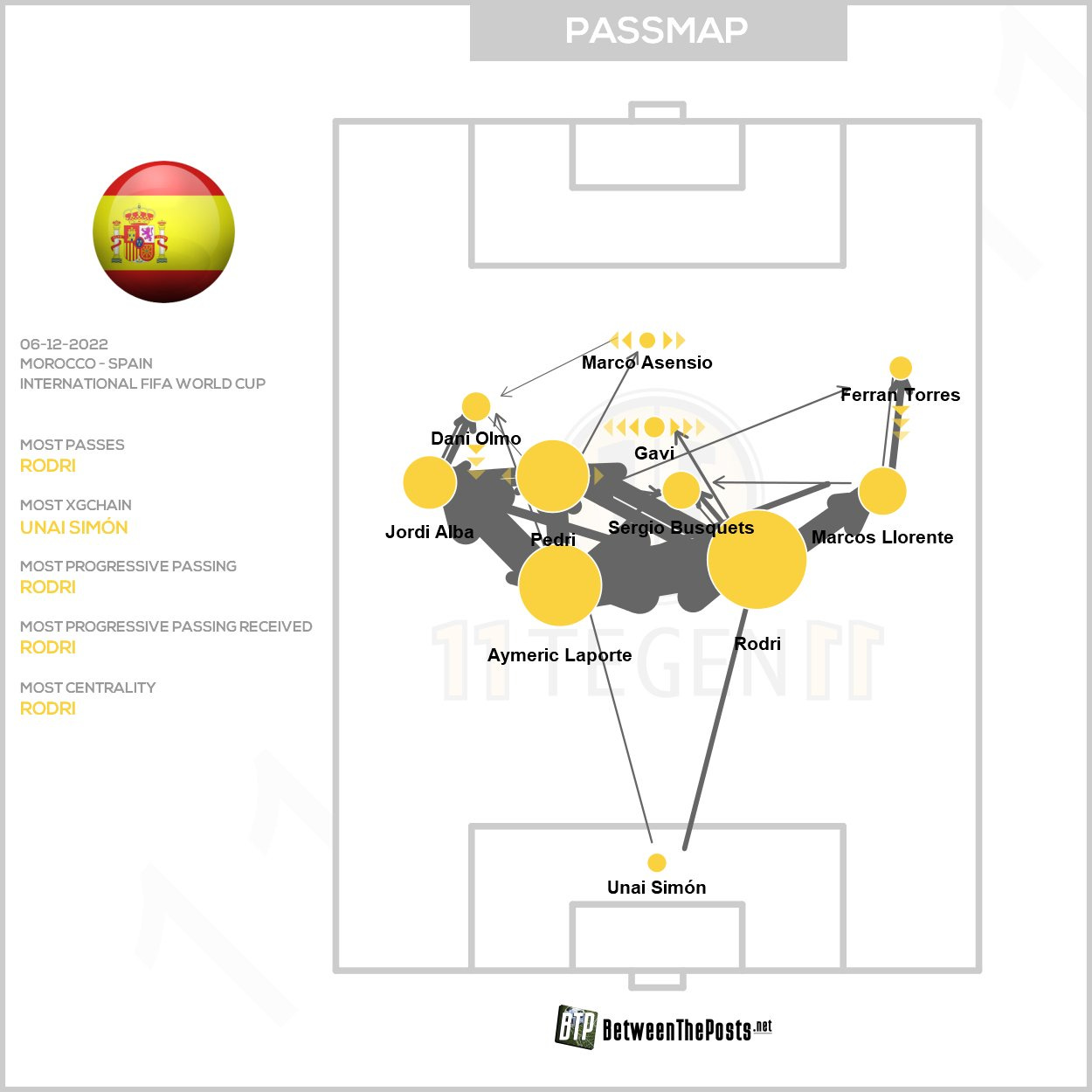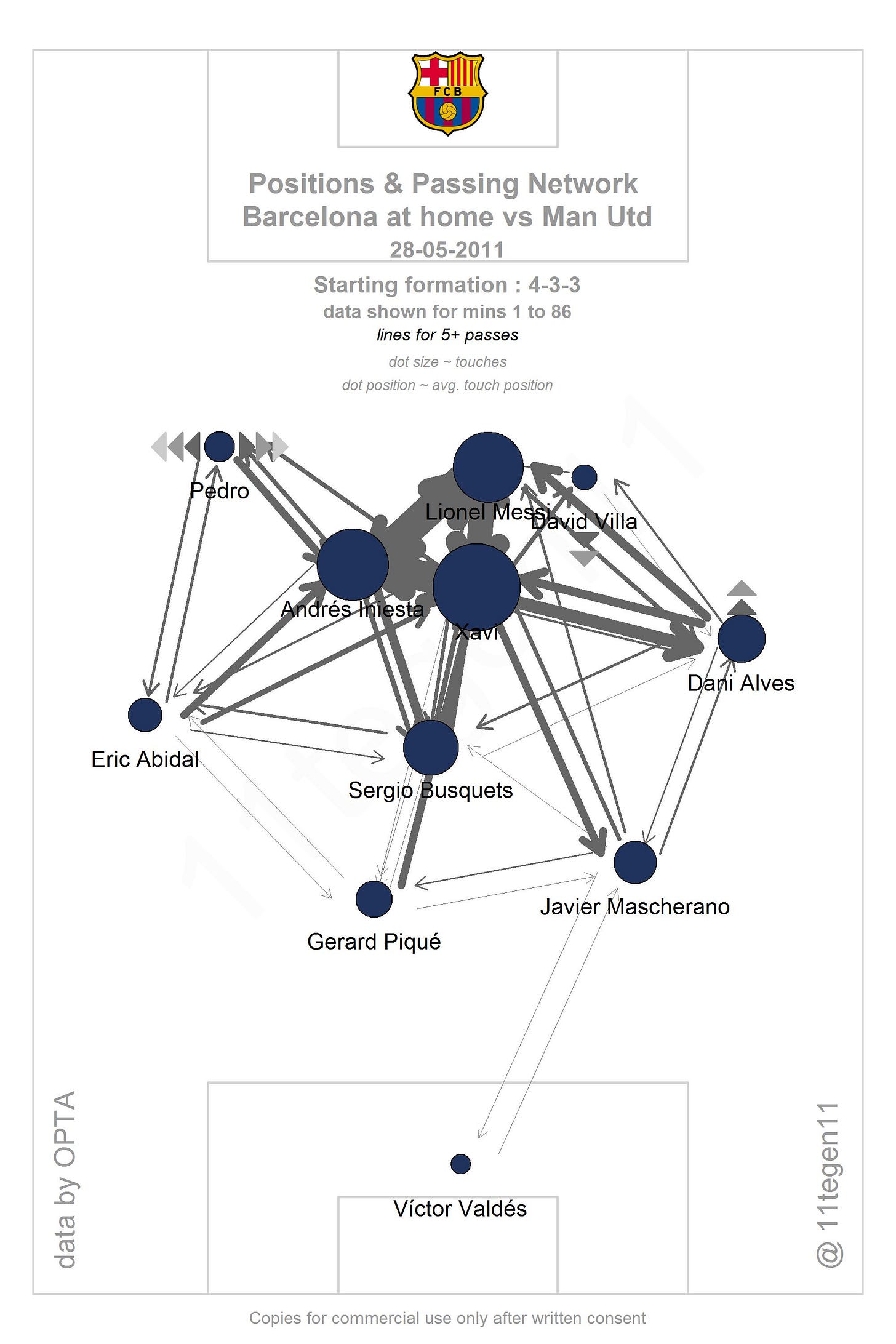Sorry this one took a while, but it’s not like football was happening in the meantime. Let’s get into it.
Morocco 0-0 Spain (Morocco win on penalties)
Let’s start with what might be the purest visualisation of Spain’s problems.
It looked almost exactly the same in the previous match against Japan. Big, fat lines between the defenders and some of the midfielders dropping very deep, but almost nothing to anyone in a position to hurt the opposition. This is how it always looks when things don’t go right for Spain: endless sideways passes that don’t get anywhere near the opponent’s goal. You might be wondering whether this is just what tiki-taka looks like when expressed on a passmap. But let’s look at the greatest single performance in that style I’ve ever seen – Barcelona in the 2011 Champions League final – and see which players are the most involved.
Barcelona had Xavi, Andrés Iniesta and Lionel Messi making the most passes that day, all in areas high up the pitch. Spain’s passing was dominated by the two centre backs. This isn’t about whether possession football is the right or wrong way to play. This is about a team simply being shit at possession football.
Morocco did a good job shutting down Sergio Busquets and stopping him dictating the game, and it was pretty shocking how much that just stifled Spain’s build up play. This meant Pedri had to drift into deeper areas to collect the ball, which isn’t what you want him doing. I’m shocked that Luis Enrique didn’t figure out a solution to this. Maybe bring on Koke to play next to Busquets in a double pivot, and push Pedri up to a number ten? I’m just spitballing here. Spain should have found a different way to progress the ball into dangerous areas.
They did eventually do something far too late. Spain made a lot of substitutions, but I think the most important were bringing on Álvaro Morata for Marco Asensio and Nico Williams for Ferran Torres. I don’t think either Morata or Williams are particularly great players. But Williams stretched the game in wide areas while Morata stretched it in behind. It was just more varied and interesting. But not interesting enough, and Spain laboured to produce good chances.
What gets me is that Luis Enrique1 was supposed to be the answer to all of this. He was supposed to increase the tempo of the side, maintaining principles of positional play but adding more zip and urgency. Even when Vicente del Bosque’s Spain won the World Cup in 2010, I felt as though they did it with the handbrake on. Spain had access to the Barcelona midfield, the best midfield trio in the history of football, and chose to shoehorn in Xabi Alonso for extra solidity. The Spanish national side often get put in the same bracket as Barcelona, but they always played a more conservative version of positional play. Pep Guardiola (rightly) insists his teams have never played tiki-taka, but Spain do it all the time.
That was supposed to be over. Luis Enrique has been steadfast in ignoring the opinions of everyone else in Spain. This is his team, breaking through the dogmas of his predecessors, and the end result is exactly the same as the last World Cup. I think this might have been more worrying than Germany’s group-stage exit in some ways (though I could change my mind on that tomorrow). Spain produced barely a quarter of an expected goal in the first 70 minutes before changing their approach. So if this isn’t what the manager wants (and I truly believe that to be the case), what’s happening? Is he unable to communicate his ideas and get the players to buy in? Is the squad not good enough in the areas he wants to change things? Is the talent so rigidly suited to this one style that the team ends up playing like this, no matter what?
All of it needs serious reflection. Right now, there are more questions than answers.
Portugal 6-1 Switzerland
It probably stings for the Spanish that their neighbours both to the West and South are so happy.
Portugal obviously made the big call to drop Cristiano Ronaldo, but it was part of a broader set of changes. João Cancelo and Rúben Neves were notably dropped, giving the team a slightly different feel. If Ronaldo’s absence gave the team more mobility in the front line than the other changes did the same across the pitch. Cancelo and Neves are two of the better passers in this Portugal side, but Fernando Santos seemed to want something with more emphasis on fast transitions.
He got it.
It helps that they finished well. Portugal scored their first shot of the game, in which Gonçalo Ramos absolutely smashed the ball hard enough that the goalkeeper couldn’t do anything. Pepe powered a difficult header for the second, and Portugal found themselves 2-0 up from about half an expected goal. Maybe Switzerland would’ve offered more had they not been demoralised like that. But Portugal were still very impressive.
The contrast with Spain couldn’t be more stark. Portugal had just 48% of the ball but moved it quickly every time. Bruno Fernandes and João Felix were either side of Ramos and the dynamic seemed to suit all three players well. I do wonder how this would work against a side happy for Portugal to have all of the ball and deny those transition opportunities such as… oh, say, Morocco. I guess we’ll find out now.
I think Portugal should be ok against the North African side. They have good attackers, obviously, but they also have lots of different types of attacker. If they need to crank up the possession football a little more, they can do that. If they need to put in lots of crosses, they can do that. And if they need to play fast transitions, well, we know they can do that.
Facing Morocco might ensure Portugal maintain a more attacking style. If they win that game, I would think Santos will revert to his sufferball tactics against France or England. That might be what provides the winning ticket for Portugal. This team can adapt to different situations. We’ll see if that makes the difference.
Or they might lose to Morocco and I’ll look a fool.
I once casually abbreviated his name to just “Enrique” after the first mention in an article. A Spanish speaker rightly pointed out that his name is not Mr. Enrique, and so his full name will have to do, even if it feels wrong. When the rules of English grammar were devised, Spanish names did not get enough consideration.





Grace, do you think Spain’s inability to produce a new generation of number nines as good as a David Villa or a Fernando Torres part of the wider trend in major European countries recently of not developing that type of role/player anymore? I wonder how France for instance, even with Mbappe, will cope eventually without a Giroud or Benzema.
Great piece as usual. On the first footnote, if you’re really going to try and maintain that as a rule you’ll need to always refer to Cristiano Ronaldo as such as well.